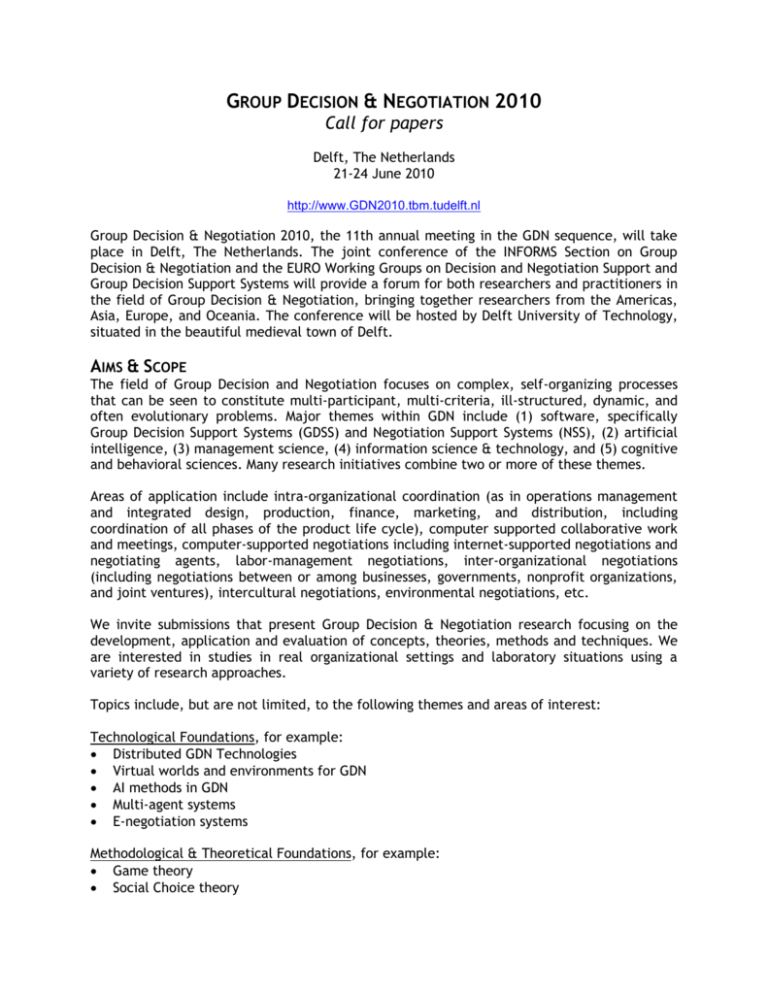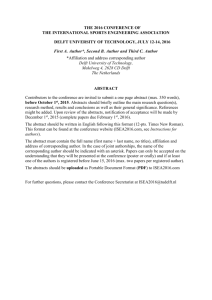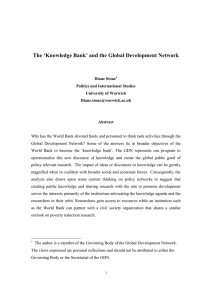group decision & negotiation 2010
advertisement

GROUP DECISION & NEGOTIATION 2010 Call for papers Delft, The Netherlands 21-24 June 2010 http://www.GDN2010.tbm.tudelft.nl Group Decision & Negotiation 2010, the 11th annual meeting in the GDN sequence, will take place in Delft, The Netherlands. The joint conference of the INFORMS Section on Group Decision & Negotiation and the EURO Working Groups on Decision and Negotiation Support and Group Decision Support Systems will provide a forum for both researchers and practitioners in the field of Group Decision & Negotiation, bringing together researchers from the Americas, Asia, Europe, and Oceania. The conference will be hosted by Delft University of Technology, situated in the beautiful medieval town of Delft. AIMS & SCOPE The field of Group Decision and Negotiation focuses on complex, self-organizing processes that can be seen to constitute multi-participant, multi-criteria, ill-structured, dynamic, and often evolutionary problems. Major themes within GDN include (1) software, specifically Group Decision Support Systems (GDSS) and Negotiation Support Systems (NSS), (2) artificial intelligence, (3) management science, (4) information science & technology, and (5) cognitive and behavioral sciences. Many research initiatives combine two or more of these themes. Areas of application include intra-organizational coordination (as in operations management and integrated design, production, finance, marketing, and distribution, including coordination of all phases of the product life cycle), computer supported collaborative work and meetings, computer-supported negotiations including internet-supported negotiations and negotiating agents, labor-management negotiations, inter-organizational negotiations (including negotiations between or among businesses, governments, nonprofit organizations, and joint ventures), intercultural negotiations, environmental negotiations, etc. We invite submissions that present Group Decision & Negotiation research focusing on the development, application and evaluation of concepts, theories, methods and techniques. We are interested in studies in real organizational settings and laboratory situations using a variety of research approaches. Topics include, but are not limited, to the following themes and areas of interest: Technological Foundations, for example: Distributed GDN Technologies Virtual worlds and environments for GDN AI methods in GDN Multi-agent systems E-negotiation systems Methodological & Theoretical Foundations, for example: Game theory Social Choice theory Bargaining theory Collaboration Engineering Multi-Criteria Decision Making Design approaches for collaboration and negotiation systems Social and Behavioral Aspects of Group Decision & Negotiation, for example: Cross-cultural and international Group Decisions and Negotiations Impact, adoption and evaluation of GDN technologies and approaches Language in GDN Creativity in GDN Emotion in GDN Facilitation Applications of Group Decision & Negotiation, for example in Business Policy Education Military Special Track: Human Factors and Computational Models in Negotiation (HUCOM) GDN2010 will host a special track for original and unpublished papers on Human Factors and Computational Models in Negotiation. Papers describing novel ideas and applications in all areas related to human factors and computational models in negotiation, preference elicitation, recommendations, or group decision are of interest. For more information on HUCOM, see http://mmi.tudelft.nl/hucom2010 or contact Catholijn Jonker at c.m.jonker@tudelft.nl. Special Event: Doctoral Consortium GDN2010 will host a Doctoral Consortium. The consortium will offer PhD researchers an opportunity to present and discuss their dissertation research progress with other students and faculty. Consortium participants will receive feedback and suggestions regarding their research. Participating faculty will engage in discussions on academic research in GDN and the academic community in general. The GDN2010 Consortium will be held on 21 June, just before the conference. PhD researchers are invited to submit a short paper that gives an overview of their research. The paper should be limited to 6,000 words, and include the following: problem statement, research question(s), literature review, theoretical/technical model or framework, research method, preliminary findings, and planning. For more information on the Doctoral Consortium, please contact: Robert Briggs, University of Nebraska at Omaha, rbriggs@unomaha.edu Stephan Lukosch, Delft University of Technology, s.g.lukosch@tudelft.nl TYPES OF CONTRIBUTIONS Prospective authors are invited to submit research contributions representing ongoing or completed work. Authors can submit abstracts, full papers, session proposals, and panel proposals: Abstracts provide a summary of ongoing or completed research and are no more than 1,500 words in length. Full papers provide a detailed account of completed research and are no more than 6,000 words in length. Session proposals group three papers (either abstracts or full papers) that address a GDNrelevant theme. The proposal briefly outlines the theme of the session and lists the abstracts and/or papers with titles and authors. The actual abstracts and papers are submitted separately. Panel proposals describe the key issue of the panel, the way in which the panel will be structured, and list (potential) panelists. Panel proposals are no more than 2,000 words in length. The program committee will review all submissions. The GDN 2010 Proceedings will include all accepted abstracts, papers, and panels. Full paper submissions will be considered for a special issue in the journal Group Decision & Negotiation, based on an additional round of reviews. Submissions to GDN and the Doctoral Consortium can be made at www.easychair.org/conferences/?conf=gdn2010 Submissions for the special HUCOM track should be made at: http://www.easychair.org/conferences/?conf=hucom2010 IMPORTANT DATES 1 February 2010: 1 March 2010: 1 April 2010: 1 May 2010: 1 May 2010: 1 May 2010: 21 June 2010 21 June 2010 22-24 June 2010 Deadline for all abstracts and sessions proposals Deadline for papers, panel proposals, and doctoral consortium papers Communication of referees' decisions Hotel Registration deadline Early Registration deadline Final versions of accepted contributions due for inclusion in proceedings Conference begins Doctoral Consortium Paper & Panel presentations CONFERENCE OFFICERS General chairs D. Marc Kilgour, Wilfrid Laurier University Melvin F. Shakun, New York University Program chair Gert-Jan de Vreede, University of Nebraska at Omaha Program chair HUCOM Track Catholijn Jonker, Delft University of Technology Organizing chairs Gwendolyn Kolfschoten, Delft University of Technology Koen Hindriks, Delft University of Technology Doctoral consortium chairs Robert Briggs, University of Nebraska at Omaha Stephan Lukosch, Delft University of Technology PROGRAM COMMITTEE Fran Ackermann, University of Strathclyde Adiel Almeida, Federal University of Pernambuco Deepinder Bajwa, Western Washington University Imed Boughzala, National Institute of Telecommunications-France Robert Briggs, University of Nebraska at Omaha Jim Bryant, Sheffield Hallam University Tung Bui, University of Hawaii Christer Carlsson, Abo Akademi University Joao Paulo Costa, University of Coimbra Colin Eden, University of Strathclyde Jamshid Etezadi, Concordia University Raimo Hamalainen, Helsinki University of Technology Koen Hindriks, Delft University of Technology Matthias Jarke, Rheinisch-Westfaelische Technische Hochschule Aachen Catholijn Jonker, Delft University of Technology Gregory Kersten, Concordia University Ozgur Kibris, Sabanci University D. Marc Kilgour, Wilfrid Laurier University Des Klass, Curtin university of Technology Sabine Koeszegi, University of Vienna Gwendolyn Kolfschoten, Delft University of Technology Stephan Lukosch, Delft University of Technology Igor Mayer, Delft University of Technology Hannu Nurmi, University of Turku Amer Obeidi, University of Waterloo Roni Reiter-Palmon, University of Nebraska at Omaha Ahti Salo, Helsinki University of Technology Bill Samuelson, Boston University Mareike Schoop, University of Höhenheim Melvin Shakun, New York University Ofir Turel, California State University Rudolf Vetschera, University of Vienna Christof Weinhardt, Karlsruhe Institute of Technology Andrzej Wierzbicki, National Institute of Telecommunications-Poland Yufei Yuan, McMaster University Pascale Zaraté, Université Paul Sabatier John Zeleznikow, Victoria University





